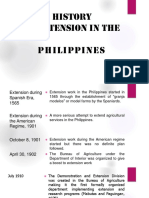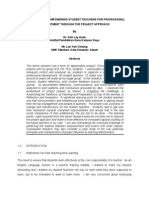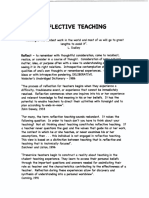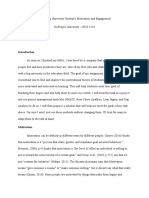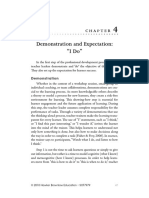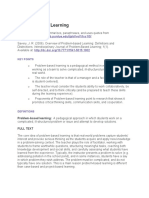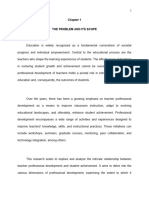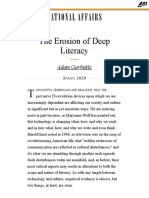Coaching For Instructional Improvement: Themes in Research and Practice
Coaching For Instructional Improvement: Themes in Research and Practice
Uploaded by
hays27Copyright:
Available Formats
Coaching For Instructional Improvement: Themes in Research and Practice
Coaching For Instructional Improvement: Themes in Research and Practice
Uploaded by
hays27Original Description:
Original Title
Copyright
Available Formats
Share this document
Did you find this document useful?
Is this content inappropriate?
Copyright:
Available Formats
Coaching For Instructional Improvement: Themes in Research and Practice
Coaching For Instructional Improvement: Themes in Research and Practice
Uploaded by
hays27Copyright:
Available Formats
a journal for research, leadership, and practice
Coaching for Instructional Improvement:
Themes in Research and Practice
by Beth Boatright, PhD and Chrysan Gallucci, PhD
with Judy Swanson, Michelle Van Lare and Irene Yoon
his article summarizes major strands of research
and pressing issues of practice associated with
instructional coaching. Here we set the stage for
the Spring 2008 issue with some background information
on what is known, what is as of yet unknown, and some
directions for future inquiry.
A problem of professional
development practice
Having an array of content-specific pedagogical tools enFrom left to right: Michelle Van Lare, Chrysan Gallucci,
ables teachers to develop all students learning and ulti- Irene Yoon, and Beth Boatright (not pictured: Judy
mately see that all Swanson)
students not just
those who traditionally do well have the intellectual capacity to reach and exceed high standards. Professional development opportunities exist for teachers, but rarely address these central issues directly, or in effective ways that
impact what happens in classrooms (Darling-Hammond,
1997). Here we have an unmistakable problem of professional development practice: the problem of relevance.
Teachers rightfully ask, What does this professional deAbout the authors
velopment activity have to do with my daily work?
Beth Boatright, PhD, is a Research Associate at
In response to this relevance problem, a new kind
the Center for Educational Leadership (CEL) at the
University of Washington (UW). Her recent research
of support system is emerging. Aimed at bridging the gap
focuses on outcomes of professional learning
between formal professional development and classroom
opportunities in high school classrooms, which will
be the topic of her forthcoming book, Teachers
implementation, instructional coaching has captured
Professional Learning in the Context of High School
the attention of scholars and practitioners nationwide as
Reform. eeb2@u.washington.edu
a promising strategy for professional learning (Stein &
Chrysan Gallucci, PhD, is Associate Research
DAmico, 2002; Neufeld & Roper, 2003; Stein, Hubbard,
Faculty in the College of Education at UW, Research
Director of CEL, and Program Co-Director of
& Mehan, 2004; Hubbard, Mehan, & Stein, 2006;
the Masters in Instructional Leadership degree.
Marsh, Kerr, Ikemoto, Darilek, Suttorp, Zimmer, Barney,
Publications include Using sociocultural theory to
link professional learning to organizational support
2005; Gallucci, Boatright, Lysne, & Swinnerton, 2005;
in the context of school district instructional reform,
Mangin & Stoelinga, 2008). Here, coaching is based on
forthcoming, in the American Journal of Education;
and Converging reform theories in urban middle
the assumption that close and continuing attention from
schools: District-guided instructional improvement in
an outsider, who brings new ideas and fresh eyes to the site
small schools of choice, 2007, in Teachers College
Record, with colleagues Michael Knapp, Anneke
of reform, can help school-based educators re-imagine, reMarkholt, and Suzanne Ort.
design, and renew their practice in ways that improve the
Judy Swanson, Michelle Van Lare, and Irene
quality of all students learning (Marzolf, 2006).
Yoon, are engaged in qualitative studies of CEL/
What does this
professional development
activity have to do with
my daily work?
district partnerships that focus on the work of
instructional leaders and systemic instructional
improvement across multiple school districts.
continues on page 4
volum e 2 , # 1 S pr i ng 2 0 0 8
Wa s h i n g t o n S ta t e K a p pa n
What we know about coaching
and high quality professional
development
When professional development takes teachers experiences and work contexts seriously from its inception, when it considers teachers as more than consumers of knowledge but also engaged actively in
inquiry, and when it aims for professional growth
and colleagueship, teachers are more likely to engage intellectually, socially, and emotionally with
ideas, materials, and their work peers (Little, 1993).
Simply, professional development that addresses the
specific, daily needs of teachers and their students
is more likely to produce changes in teachers practice (Joyce & Showers, 1982). Furthermore, teachers
benefit most when their learning is reinforced over
time through repeated and varied exposure to ideas
and through interactions with colleagues, who can
act as a resource for each others learning (as cited in
Knapp, 2003, p. 121, based on Cohen & Hill, 2001;
Desimone, Porter, Garet, Yoon, & Birman, 2002).
Coaching has the potential to accomplish this, if orchestrated over the long-term, and focused on ongoing collaboration between professionals around
a common problem of practice that they deem
important.
Coaching utilizes a variety of pathways to help
teachers, school leaders, and district leaders build
school capacity for sustained change and improvement (Neufeld & Roper, 2003). Principals and central
office staff, for instance, may use leadership coaches
to guide their classroom walkthroughs or planning
meetings. At the classroom level, instructional coaching might look different; it could take the form of
one-on-one support for teachers, or guided observation and debrief of their colleagues teaching.
Due to varied roles and responsibilities of the
job, however, defining coaches work has proven
difficult for researchers (as summarized by Taylor,
2008). Most definitions of coaching offer general
approximations of what coaches do, such as, use
conversation skills, listening, curiosity, compassion,
expertise, and problem solving to help others move
toward their goals, hopes, and dreams (McNeil &
Klink, 2004) or nonsupervisory/nonevaluative individualized guidance within the instructional setting (Taylor, p. 12). And, while ambiguous, it is
possible that these generic definitions are the closest
approximation to what coaches do, given the highly nuanced nature of the work. Coaching involves
humans in all of their individuality and unpredictability who must navigate difficult issues of
trust, communication, and inevitable differences of
opinion.
Our observations agree with other scholars who
suggest coaching can benefit educators by (a) promoting active reflection on current practices (Stein
& DAmico, 2002; Garmston, Linder, & Whitaker,
1993; Joyce & Showers, 1982), (b) teaching them
how to apply new concepts to their unique work
environments (Showers & Joyce, 1996; Neufeld &
Roper, 2003), (c) building generative communities of
practice (Showers, 1985; Lowenhaupt & McKinney,
2007), and (d) fostering professionalism among colleagues (Perkins, 1998; Garmston, 1987). Most important, good coaches maintain a humble stance on
how hard the work of teaching really is. They reframe teachers issues as part of a greater problem of
practice that all educators struggle with: how to simultaneously push all students to their potential and
cultivate their desire to learn.
Coaching in action
When skillfully applied, coaching can provide productive learning environments for educators, particularly when it relates to a larger reform agenda and is
embedded in actual work settings (Showers & Joyce,
1996). The Center for Educational Leadership at the
University of Washington has developed programs
to support instructional leadership and strengthen
content knowledge in over 20 districts across five
states. Associate Director Anneke Markholt explains
the Centers rationale for including coaches in their
partnership work:
We believe that if people just come and have
their sit and git, no matter how good the sit
and git is, its not real until you are side-byside with somebody who can help you think
through the skills and processes in your own
site with your own teachers You cant just
have the [formal professional development
sessions] without the coaching, nor can you
have the coaching without the [professional
development sessions].
volum e 2 , # 1 S pr i ng 2 0 0 8
a journal for research, leadership, and practice
While researching the CEL-district partnerships, we
had opportunities to speak with scores of teachers,
principals, and literacy coaches in Washington state
about how coaching is enacted. Teachers mentioned
that working right here with the kids, trying it on in
real time was important to them:
How to describe ityoure in the classroom.
Youre not watching a videotape of somebody
teaching. Youre right here in the moment
saying, Why did you do that? Were in
the classroom, sitting down with a real student talking to them about their reading and
then immediately going back together and
sitting and saying, heres what I saw, and
what did you notice?
Looking ahead:
Questions for future research
While we know a little about coaching structures and
some of its possible benefits, many questions remain.
Not surprisingly, scholars and practitioners question
the extent to which coaching shapes student learning over the long haul. To answer this, longitudinal
studies of larger scope may be in order. And yet, an
emergent strand of inquiry directs our attention to
the idea of coaching content knowledge. Educators
are beginning to ask about the nature of what coaches must know, and how coaches learn to improve
their craft. They are asking:
1. What knowledge is needed to coach teachers?
What is the specific knowledge required to
coach science teachers? Reading specialists?
Algebra teachers? How much and what kind
of content knowledge is enough for a person
to become a coach?
2. What do coaches need to develop their own
learning?
3. How might learning theory inform our understanding of how teachers and coaches engage in instructional coaching? (Gibson,
2005, and Gallucci, in press, provide initial
examples)
Other questions involve the sustainability of ongoing coaching interventions, given its heavy reliance
on human (hence, expensive) resources:
1. How long does coaching need to last to reach
a sustainable level of continuous progress? Is
there ever a point when external expertise is
no longer needed?
2. How can such an expensive form of professional development be applied on a large
scale? What about tending to immediate accountability requirements (e.g., WASL)?
None of these questions suggest simple solutions. As
more and more school districts invest in instructional coaches to help teachers learn to teach all students
to higher standards, a coherent, rigorous research
agenda is needed to assess the impact that coaching can have on changing teacher practice. This kind
of research agenda has the potential to strengthen
our understanding of how coaching might ultimately shape the quality of teaching and learning in
Washingtons public schools.
References
Cohen, D. K., & Hill, H. (2001). Learning policy: When state
education reform works. New Haven, CT: Yale University
Press.
Darling-Hammond, L. (1997). The right to learn. San
Francisco: Jossey-Bass.
Desimone, L., Porter, A. P., Garet, M. S., Yoon, K. S., &
Birman, B. F. (2002). Effects of professional development on
teachers instruction: Results from a three-year longitudinal
study. Educational Evaluation and Policy Analysis, 24(2),
81-112.
Gallucci, C. (in press). District-wide instructional reform:
Using sociocultural theory to link professional learning to
organizational support. American Journal of Education.
Gallucci, C., Boatright, E., Lysne, D., & Swinnerton, J.
(2005). The pedagogy of third-party support for instructional
improvement: A partnership between CEL and Highline School
District. Seattle, WA: The Center for the Study of Teaching
and Policy, University of Washington.
Garmston, R. (1987). How administrators support peer
coaching. Educational Leadership, 44(5), 18-26.
Garmston, R., Linder, C., & Whitaker, J. (1993). Reflections
on cognitive coaching. Educational Leadership, 51(2), 57-61.
Gibson, S. A. (2005). Developing knowledge of coaching.
Issues in Teacher Education, 14(2), 63-74.
Hubbard, L., Mehan, H., & Stein, M. K. (2006). Reform as
learning: School reform, organizational culture, and community
politics in San Diego. New York: Routledge.
Joyce, B., & Showers, B. (1982). The coaching of teaching.
Educational Leadership, 40(1), 4-10.
Knapp, M. S. (2003). Professional development as a policy
volum e 2 , # 1 S pr i ng 2 0 0 8
continues on page 36
You might also like
- Mark E. Bouton - Learning and Behavior - A Contemporary Synthesis-Sinauer Associates Is An Imprint of Oxford University Press (2016)Document576 pagesMark E. Bouton - Learning and Behavior - A Contemporary Synthesis-Sinauer Associates Is An Imprint of Oxford University Press (2016)Alex Solorzano100% (2)
- Final Project Instructional Plan For Adult LearnersDocument9 pagesFinal Project Instructional Plan For Adult Learnersapi-236205448No ratings yet
- Extension EducationDocument273 pagesExtension EducationPhilip Ameling100% (2)
- Leader of LearningDocument8 pagesLeader of Learningapi-205724788No ratings yet
- Baby ThesisDocument25 pagesBaby ThesisVanessa PamparoNo ratings yet
- Elementys of ProfessionDocument11 pagesElementys of ProfessionfrederickNo ratings yet
- Goh Lay Huah ThesisDocument29 pagesGoh Lay Huah ThesisMuhammad IzWan AfiqNo ratings yet
- Reflective Teaching: Reflect - To Remember With Thoughtful Consideration, Come To RecollectDocument14 pagesReflective Teaching: Reflect - To Remember With Thoughtful Consideration, Come To Recollectወልደ መስቀል ፍቅሩNo ratings yet
- What Went Well What Didn T Go So Well Growth of Reflection in Pre Service TeachersDocument16 pagesWhat Went Well What Didn T Go So Well Growth of Reflection in Pre Service TeachersRahil99 MahNo ratings yet
- What It Takes To Be An Instructional PDFDocument4 pagesWhat It Takes To Be An Instructional PDFJoe Hung100% (1)
- Assignment 1 Week2 Final1Document6 pagesAssignment 1 Week2 Final1api-246926247No ratings yet
- 3I'SDocument7 pages3I'SShenmyer Pascual CamposNo ratings yet
- Unit 8assessment2finalpaperDocument7 pagesUnit 8assessment2finalpaperapi-377603622No ratings yet
- Book Review: How Learning Works: 7 Research-Based Principles For Smart Teaching by Susan A. Ambrose, Michael W. Bridges, Michele DiPietro, Marsha C. Lovett, Marie K. Norman, and Richard E. MayerDocument3 pagesBook Review: How Learning Works: 7 Research-Based Principles For Smart Teaching by Susan A. Ambrose, Michael W. Bridges, Michele DiPietro, Marsha C. Lovett, Marie K. Norman, and Richard E. Mayermohammed100% (1)
- Teacher Motivation DissertationDocument5 pagesTeacher Motivation DissertationCanSomeoneWriteMyPaperForMeMadison100% (2)
- Theoretical Framework Peer ObservationDocument13 pagesTheoretical Framework Peer ObservationAntonieta HernandezNo ratings yet
- Thesis On Personality Traits of TeachersDocument4 pagesThesis On Personality Traits of Teachersafcmoeptd100% (1)
- Advanced PedagogyDocument5 pagesAdvanced PedagogyRahul Sharma100% (3)
- Portfolio Activity Unit 8Document7 pagesPortfolio Activity Unit 8Gregory Pilar100% (1)
- Leading For Professional Learning - Foreward and Chapter 5Document16 pagesLeading For Professional Learning - Foreward and Chapter 5UWCEL100% (2)
- Project of Element, Need and Nature ofDocument29 pagesProject of Element, Need and Nature ofZain SaeedNo ratings yet
- Chapter 7 ReportingDocument33 pagesChapter 7 ReportingNeliza SalcedoNo ratings yet
- Chapter 7 Reporting PDFDocument33 pagesChapter 7 Reporting PDFNeliza SalcedoNo ratings yet
- Mckenna 3Document27 pagesMckenna 3jecho0199No ratings yet
- Alfa Muritador ProjectDocument38 pagesAlfa Muritador ProjectAtoba AbiodunNo ratings yet
- Qualitative Research Paper Dalton Hindieh Edd 1005 Section 1 Dani Hindiehs Conflicted Copy 2018-04-28Document19 pagesQualitative Research Paper Dalton Hindieh Edd 1005 Section 1 Dani Hindiehs Conflicted Copy 2018-04-28api-447186835No ratings yet
- Irazabal Platform Statement-FinalDocument8 pagesIrazabal Platform Statement-Finalapi-227987991No ratings yet
- Instructional LeadershipDocument4 pagesInstructional LeadershipJanus SalinasNo ratings yet
- CITATION SCH13 /L 1033Document4 pagesCITATION SCH13 /L 1033Shubha JainNo ratings yet
- SOT7979 - Bab - 4 & 5Document34 pagesSOT7979 - Bab - 4 & 5aryandi meetingNo ratings yet
- Problem-Based LearningDocument13 pagesProblem-Based LearningEstela BenegildoNo ratings yet
- Learning Theories: Theories and Models of Learning For Educational Research and Practice. This KnowledgeDocument14 pagesLearning Theories: Theories and Models of Learning For Educational Research and Practice. This KnowledgeDiane ChuNo ratings yet
- Art's and EthicsDocument4 pagesArt's and EthicsArifin KhoirNo ratings yet
- Theoretical Background in Teacher EducationDocument22 pagesTheoretical Background in Teacher EducationmixalakisskiesNo ratings yet
- Aee 121-3Document17 pagesAee 121-3makariosstephenNo ratings yet
- Portfolio Part Three - 4Document14 pagesPortfolio Part Three - 4api-726137067No ratings yet
- DuToitandReissner2012pre ProofDocument36 pagesDuToitandReissner2012pre ProofArdhan Pratama MuktiNo ratings yet
- Topic: The Decreasing Effectivity of Teachers To StudentsDocument4 pagesTopic: The Decreasing Effectivity of Teachers To StudentsKaren ArandiaNo ratings yet
- Sample Thesis About Curriculum DevelopmentDocument5 pagesSample Thesis About Curriculum Developmentgjgd460r100% (2)
- Review of Related LiteratureDocument15 pagesReview of Related LiteratureZenly AlleraNo ratings yet
- Learning TheoriesDocument12 pagesLearning Theoriesapi-299665237No ratings yet
- Project Based and Problem Based Learning SummaryDocument5 pagesProject Based and Problem Based Learning Summaryhusteadbetty100% (1)
- Philosophy LogDocument13 pagesPhilosophy Logapi-355889713No ratings yet
- Writing A Research: Group 3Document32 pagesWriting A Research: Group 3Kylla Shane DuntonNo ratings yet
- Task 2: How Does Research Contribute To Teacher S Development?Document23 pagesTask 2: How Does Research Contribute To Teacher S Development?Nestor Almanza KmlsNo ratings yet
- ApproachesDocument24 pagesApproachesFey PuertoNo ratings yet
- JNM FinalDocument20 pagesJNM Finalkeneilweshabalala1No ratings yet
- Gestalt Psychology Aftermath InaccessibleDocument8 pagesGestalt Psychology Aftermath InaccessibleRhodora A. BorjaNo ratings yet
- Egbo 2013Document9 pagesEgbo 2013Christian BueNo ratings yet
- Philosophical ShiftuploadDocument12 pagesPhilosophical Shiftuploadapi-238982242No ratings yet
- 08 Sudbury Pedagogcal Leadership WorkshopDocument32 pages08 Sudbury Pedagogcal Leadership WorkshopLemon TeaNo ratings yet
- A Teaching Model For Concept Learning and Changes in Critical ThinkingDocument6 pagesA Teaching Model For Concept Learning and Changes in Critical ThinkingTriharyatiNo ratings yet
- Module 1: Effective Teaching: I-ObjectivesDocument6 pagesModule 1: Effective Teaching: I-ObjectivesGraciella MabalingNo ratings yet
- Teacher Leadership Module 4 Brittni CB 2Document4 pagesTeacher Leadership Module 4 Brittni CB 2api-682781902No ratings yet
- NSDC CoachingDocument4 pagesNSDC CoachingirdhinNo ratings yet
- Mentoring as Professional Development for MentorsDocument22 pagesMentoring as Professional Development for Mentorssarah.marcellaNo ratings yet
- Designing Teaching and Learning Assignment 1Document7 pagesDesigning Teaching and Learning Assignment 1api-374459547No ratings yet
- Student Learning Guides Teacher InquiryDocument2 pagesStudent Learning Guides Teacher InquiryKen WhytockNo ratings yet
- Chapter 1 5Document30 pagesChapter 1 5Joylene CagasanNo ratings yet
- Transform Adult Education: Expert Teaching Strategies for EducatorsFrom EverandTransform Adult Education: Expert Teaching Strategies for EducatorsRating: 5 out of 5 stars5/5 (2)
- Year 4 KSSR Paper 2 ENGDocument7 pagesYear 4 KSSR Paper 2 ENGhays27No ratings yet
- Sociocultural PDFDocument16 pagesSociocultural PDFhays27No ratings yet
- RPT Bi Year 3 2017Document18 pagesRPT Bi Year 3 2017hays27No ratings yet
- Writing A Literature ReviewDocument6 pagesWriting A Literature Reviewhays27No ratings yet
- Assignment 2Document2 pagesAssignment 2404xenosNo ratings yet
- 9 Level of MindDocument1 page9 Level of Minddilipp_20% (1)
- Jazz ChantsDocument3 pagesJazz Chantsselva0% (1)
- Shs Class Program: Gov. Mariano E. Villafuerte High SchoolDocument1 pageShs Class Program: Gov. Mariano E. Villafuerte High SchoolMC MirandaNo ratings yet
- Everyday Science PDFDocument2 pagesEveryday Science PDFSara100% (1)
- Laws of Extraordinary SuccessDocument2 pagesLaws of Extraordinary Successmcvelli40No ratings yet
- Grade 1 LPDocument5 pagesGrade 1 LPAlbert Joe AbrinaNo ratings yet
- 33 Ways To Speak Better EnglishDocument7 pages33 Ways To Speak Better EnglishAli S HaniNo ratings yet
- Shaw Et Al-2015-Human Resource Management JournalDocument13 pagesShaw Et Al-2015-Human Resource Management Journalshy_cryNo ratings yet
- Pedagogy of The Oppressed - Quotes and ReflectionDocument2 pagesPedagogy of The Oppressed - Quotes and ReflectionRobby FernandezNo ratings yet
- Advanced English For Academic PurposesDocument7 pagesAdvanced English For Academic PurposesDuy NguyễnNo ratings yet
- DLP Propaganda Techniques STEDocument10 pagesDLP Propaganda Techniques STEMaicy Joy Balbin0% (1)
- Facilitating Learning Conditions of LearningDocument18 pagesFacilitating Learning Conditions of Learningjade tagabNo ratings yet
- Prepared:: Melanie S. Obenza Reviewed: Teacher III Master Teacher IIDocument11 pagesPrepared:: Melanie S. Obenza Reviewed: Teacher III Master Teacher IICatherine RenanteNo ratings yet
- 12 94z2l0w6Document11 pages12 94z2l0w6Kevin TambienNo ratings yet
- Learning Through TeachingDocument25 pagesLearning Through TeachingChi nguyenNo ratings yet
- JK Laxmi T&D Medha Bhatt PDFDocument60 pagesJK Laxmi T&D Medha Bhatt PDFJaya SharmaNo ratings yet
- Sondra Lynn Polan Final Project Template 1Document11 pagesSondra Lynn Polan Final Project Template 1api-399832630No ratings yet
- Alzheimer's Society Job Description Senior Press OfficerDocument7 pagesAlzheimer's Society Job Description Senior Press Officerapi-25900234No ratings yet
- Balanced Scorecard Basics (BSC)Document5 pagesBalanced Scorecard Basics (BSC)ni gede agung septiNo ratings yet
- The Effects of Automation and Artificial Intelligence On Employment and ReskillingDocument5 pagesThe Effects of Automation and Artificial Intelligence On Employment and Reskillingabhijitpaul1544No ratings yet
- Study Guide 3 NCMDocument13 pagesStudy Guide 3 NCMNovelyn PuaNo ratings yet
- Scientific and Technical Translation, by Maeve Olohan, New York, Routledge, 2015, VIII + 253 PP., US$39.95, ISBN 978-0-415-83786-6 (PBK)Document4 pagesScientific and Technical Translation, by Maeve Olohan, New York, Routledge, 2015, VIII + 253 PP., US$39.95, ISBN 978-0-415-83786-6 (PBK)Abdelkader BennaoumNo ratings yet
- CATEGORIZATION Pg. 99 101Document4 pagesCATEGORIZATION Pg. 99 101Erica B. DaclanNo ratings yet
- Educator Resume - Sarah BalisalisaDocument3 pagesEducator Resume - Sarah Balisalisaapi-299920222No ratings yet
- The Erosion of Deep Literacy - National AffairsDocument27 pagesThe Erosion of Deep Literacy - National AffairsAlix PasquetNo ratings yet
- Descriptive MethodDocument46 pagesDescriptive MethodDK'S PATATANo ratings yet
- DLL - Science 6 - Q1 - W6Document3 pagesDLL - Science 6 - Q1 - W6dianne grace incognitoNo ratings yet



